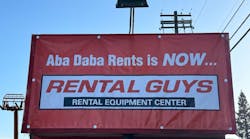Thinking of selling your business? This is a major life event right up there with marriage, having kids or even a death in the family. My strong recommendation to potential clients is to make sure you have a high degree of confidence, if, and when, you take your business to market, that it will sell and sell at a price that makes sense for you. I’ve seen businesses out there that have a reputation of “always being for sale” and that can negatively affect an acquirer’s perception of your business.
Match the Timing of the Market (“Macro”) with Your Best Financial Performance (“Micro”)
For those of you that have followed my articles in the past, I speak of the “macro” and the “micro” of market dynamics when looking at selling a rental company. The “macro” refers to how the overall market for rental industry acquisitions is doing. From my perspective, the acquisition market for equipment rental companies is robust with all four publicly traded companies actively looking to expand via acquisition as well as several private equity-backed regional companies and larger regional independents. I was personally involved with the frenzied acquisition market in the late 1990s; I’m not going to say that the current activity level is equal to those “glory days” but I will say that the current market (since late 2021) is the closest I’ve seen to that in my career.
The “micro” refers to how your rental company is performing. From a financial standpoint, acquirers are looking for rental companies with a consistent track record of growth in revenues and EBITDA/cash flow while simultaneously continuing to invest in updating and expanding their rental fleet. The ideal time to sell a rental company is when your financial performance is “hitting on all cylinders” and at the same time having market conditions as strong as we have now.
According to American Rental Association Rentalytics data, total North American rental revenues were up 11.48 percent in 2022 and are projected to increase by 7.26 percent in 2023. (If you are a member of the ARA, you can subscribe to the Rentalytics data for a nominal fee and get data specific to your trade area or state). The ARA data should serve as a general guideline to the relative performance of your company vs. your market area. At the same time, your EBITDA/cash flow as a percentage of revenues should be at least stable if not growing.
Consider a rental company with rental revenues down by 20 percent in 2023 vs. 2022 after having several strong years of growth. Compare that to a rental company that is up 15 percent in 2023 vs. 2022; this added to five previous years of consistent growth. The company that was down 20 percent creates uncertainty in an acquirer’s minds. Such as 1) where is the bottom? 2) is the reduced revenue level the “new normal” or has there been a significant change in the local market? and 3) Were the last few years of growth a fluke? I highly recommend being able to sell your business from a position of strength (up in 2023 vs. 2022); if recent revenues are down, there should be a valid explanation and I like to see the trends at least stabilize if not back to an upward trend.
Understand the Current Market Value of Your Business and the Tax Implications of Selling
You are going to need some professional help here, likely from two different sources. The overriding principle here is that the first time you hear the market value of your business should not be from the potential buyer of your business. I am constantly on the receiving end of phone calls from business owners that want to give me a few points of reference such as revenues or EBITDA and ask me to verbally value the business over the phone. I also talk to business owners who have personally computed a value and want me to confirm that for them. Either scenario is not fair to me or the business owner as the total picture of the company needs to be considered.
First, not all revenue is viewed the same. Rental and related revenue (rental, damage waiver, delivery) is the most valuable form of revenue. The reason being it has the highest margin of any revenue stream and is considered recurring. Non-rental revenues such as supply and equipment sales and associated margins will be scrutinized and most likely discounted vs. rental revenues. The ideal revenue mix is when rental and related revenues are 75 percent or more of total revenues.
Much like revenue, not all EBITDA is treated the same. We see a number of companies with large gains on sale of rental equipment, often selling fully depreciated units at 100 percent margins artificially inflating EBITDA. Most publicly traded companies have less than 10 percent of their total EBITDA derived from sale of used equipment from their rental fleet. Often these margins have to be “normalized” (i.e; discounted downward) from stated amounts to reflect the historical margins realized by the acquirer. Also, other add-backs including owner’s compensation, perks, and non-recurring expenses will be scrutinized closely.
Given these nuances, I recommend getting an opinion of market value from someone familiar with the industry. Before I take on any client, we verbally provide a value range as well as an honest opinion of not only the value of the business, but some honest feedback of positive and negative attributes of the business that will likely be noted by the acquirer.
Lastly, you need to know how much you will “net out” on the transaction given the value guidance. The most common type of business acquisition is a purchase of assets from a “pass-through” entity such as an S Corp or an LLC. In a purchase of assets, the seller will generally retain any cash in the business and any debt related to the assets must be paid off and will be deducted from the purchase price at closing.
Once the “net” proceeds at closing are determined, the final “net” to the seller is determined by the amount of taxes that will have to be paid in relation to the transaction. The one “shock” I see from many sellers are taxes due at the time of sale related to “bonus” depreciation either via direct deduction using Section 179 or an accelerated tax depreciation method. I highly recommend that all business owners take advantage of these tax deferral methods to reduce their annual tax liability. Keep in mind, these methods are only a deferral and will come back in the form of a larger tax liability at the time of the sale. As part of the valuation opinion on your business, you should get a rough idea on how the purchase price on the sale will be allocated to assets and goodwill.Armed with this information, your tax accountant should be able to give you a good approximation of your potential tax liability. You should not move forward with a potential sale of your business until you have professional guidance not only of the market value of your business but also what you can reasonably expect to net out after taxes.
Decided that you are going to sell? You are not done yet…
If you are going to have a successful exit of your business, you have to finish the game! Baseball is a nine-inning game; imagine if your team was ahead by three runs in the 7th inning and then decided not to play the last two innings.
When evaluating whether or not to sell, you have to look at the last 12 months of revenue and EBITDA/cash flow. At the time of decision, this is the most important period of your financial results in determining a value. That value is not necessarily static. Generally, it takes 60 to 90 days to develop serious interest from a buyer. Before making an offer, the buyer will want to see the most recent two to three months results. If those results are down, most likely the price will go down as well. Next, you sign a letter of intent that will take another 60-90 days before closing the transaction. That final 60-90 days between LOI and closing now becomes important as the results need to continue to reflect the results that were the basis of the offer.
You can’t “coast” or “take your eye off the ball” during this process. You have to continue to run the business and produce the revenue/cash flow that got you to the point of the offer. If you have a business worthy of acquisition, you’ve made some good business decisions to get you to this point. Continue to make those sound decisions. If it makes sense to buy equipment, then do so. If it makes sense to sell equipment, then do so. Keep your head in the game and finish strong!
Lastly, don’t overlook the appearance and organization of your facility. Any acquirer will want to do a walk-through while evaluating your company. The appearance and organization of your facility will set the tone for the expectations of how your business is run. If your facility is clean and organized, then the perception is that you have employees and management that are engaged, and that safety is likely a priority. I have seen some companies over the years that do not show well during the walk-through. This can cast doubt on the entire operation and cause some acquirers to lose interest or potentially discount the offer.
The acquirer will also be assessing if substantial facility upgrades are needed, and those costs could be reflected in your offer. The facility should be an adequate size to accommodate current operations as well as continued growth. The property should be properly zoned, allow easy entry and egress for delivery vehicles and include an environmentally compliant wash bay and refueling station. Whether owned by a related entity or a third-party landlord, the fair market value rent should be no more than five percent of total revenues with the landlord willing to enter into a long-term lease (base term plus options) with the acquirer.
Hire only trusted and vetted advisers
Do a “deep dive” into not only references and results but also do a thorough background check on the advisors you are considering. Check with trusted sources within the rental industry as to reputation or potential past issues. Beware of telemarketing calls promising results that are too good to be true; watch out for hype, high pressure or large up-front fees. Don’t fall for the “we already have a buyer” line! Any good business broker with an understanding of the business should be able to attract multiple buyers in this market. Often, a simple Google search of names of brokers or brokerage firms can reveal warning signs. You are looking for a true partner in this process that will look out for your best interests and give you honest feedback.
With the right advice and guidance, now could be a good time to start exploring a sale of your rental business.
Gary Stansberry is the President of The Stansberry Firm, LLC and specializes in rental business sales and consulting with businesses to increase their value. Gary has handled the sale of more than140 rental business with a transaction value of over $2 billion. More information on the company can be found at www.thestansberryfirm.com. Gary can be reached at (817)233-0922 or by email at [email protected].








